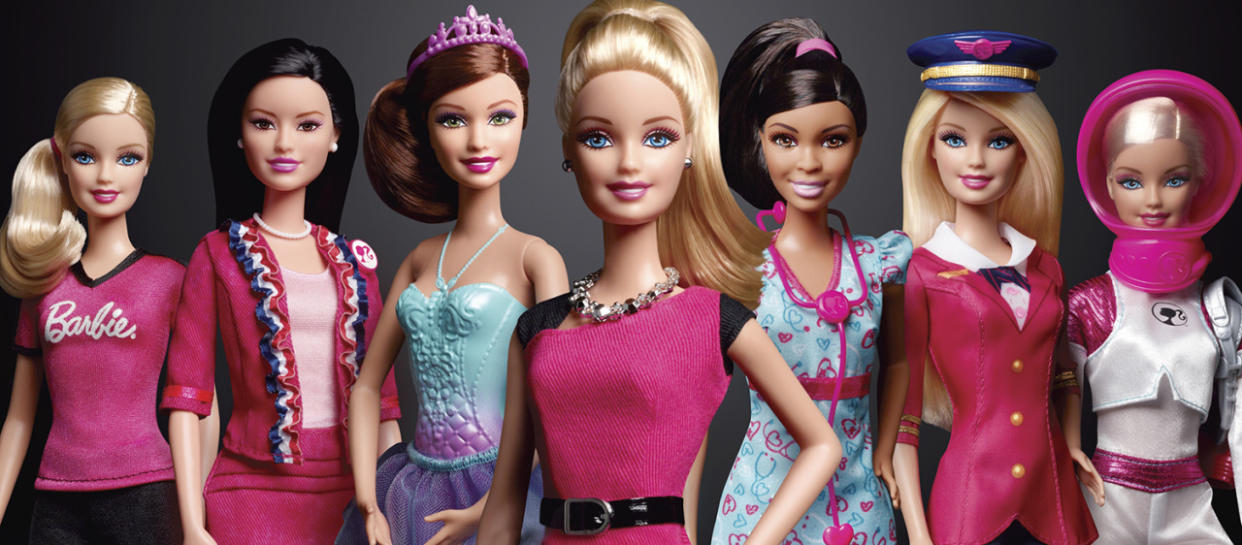Barbie’s New Ad Stirs Controversy

A new Barbie ad — which shows young girls aspiring to careers like professor, veterinarian, businesswoman, and soccer coach — kicks off Mattel’s latest campaign for the iconic dolls, but critics say that while the “Imagine the Possibilities” spot may be adorable, it’s still wishful thinking.
In the ad, which was posted on the official Barbie Facebook page last week, young girls take on their dream careers in front of unsuspecting audiences. College students giggle as a young girl lectures them on the brain, a team of male soccer players follows orders from a young coach, and a pint-size tour guide schools museum-goers on a T. rex. At the end of the nearly two-minute video, it’s revealed that the audiences were only in the young girls’ imaginations. In reality, they were simply interacting with their Barbies. The spot closes on the tag line: “When a girl plays with Barbie, she imagines everything she can become.”
STORY: ‘Real-Girl Barbie’ Is a Big Hit
The video — which has more than 40,000 shares and 66,500 likes on Facebook — has gotten mixed reviews from users. Some identify with the little girls, remembering their own childhood affinity for different Barbies. “It was the 1984 Day to Night Barbie that actually inspired me. I knew someday I would be the CEO of a company. I just didn’t realize that I would be in workout clothes instead of a suit,” writes one user, who used the hashtag #fitnessbusiness. Another added, “My favorite Barbie dolls were my exercise Barbie and a business Barbie whose skirt would turn around after work to go party. Except I always made her be a teacher instead of a business woman. I grew up to be a teacher who loves to go work out after school.” Fans also applaud the ad’s message. “Barbie is to help little girls visualize their dreams so that they may come true one day. … It allows little girls to dream while still being little girls and enjoying their childhood, nowadays there is too much pressure for them to grow up too fast.”
STORY: Watch This Little Girl Blame Barbie for Nail Polish Disaster
But others aren’t sold, calling out Barbie’s unrealistic body standards and the company’s overall emphasis on topics less intellectually oriented. “This is clever marketing to promote a stronger image for Barbie, but Barbie sets the wrong image for girls regarding body type. If Barbie could be made to reflect natural curves and a more realistic healthy figure, this ad would be perfect,” says one user. Another adds, “Nice try Barbie, but if any of you parents have allowed your child to watch the current Barbie videos on Netflix or Amazon Prime, you will quickly see that Barbie is only concerned about beauty, fashion, boys, and vanity. I allowed my 5-year-old to watch it and was appalled and disgusted that little girls see this and are taught to believe it’s ok.”
Aurora Sherman, an associate professor of psychology at Oregon State University who has studied Barbie’s effects on young girls’ career aspirations, admits the ad is clever. “It’s humorous, it’s colorful, it’s very engaging. The folks at Mattel are really good marketers, and I do think ads that show girls aspiring to intellectual careers are a good change,” Sherman tells Yahoo Parenting. “But at the end of the day, this is still a company that sells far more Disney Princess Barbies than professor, coach, or veterinarian Barbies. If you do a search for Barbie options on Amazon, you will have a very difficult time finding a veterinarian or scientist Barbie, but they are swimming in a tsunami of princess, cheerleader, or fashion-focused Barbies.”
Without seeing those career-oriented Barbies on the shelves, Sherman says, girls are less likely to imagine themselves in those roles. “There’s nothing preventing any child from taking a Barbie in any outfit and changing her into a doctor coat, but if you don’t see the idea that you can be a doctor or professor or entrepreneur on the Barbie shelf, you won’t think you can play that way,” she says. “From what we’ve found, playing with Barbies is not the route to achieving those careers.”
Emily Coyle, a visiting professor at Beloit College and developmental psychologist who studies gender development, says Mattel’s latest ad reminds her of a study she conducted with young girls and Barbie. “I tried to use Barbie to make girls more interested in particular careers, including math and science careers, but basically it didn’t work,” she tells Yahoo Parenting. “We found that there is something so reinforcing or appealing about Barbie and how feminine she is that, even when using Barbie in a career-oriented game, what girls take away is not information about becoming an astronaut, or whatever job we’re talking about, but information about becoming Barbie.”
The ad does set some good examples, though, Coyle says. “I like that the ad is not skewed toward super-feminine jobs and shows girls in more powerful positions,” she says. “But good intentions and good science are not the same thing.”
Still, Sherman points out that Mattel is a toy company, so the purpose of the ad is not necessarily to change lives but to promote a product. “At the end of the day, Mattel just wants to sell Barbie dolls,” she says. “So I don’t think we should read too much into what is first, last, and always intended to sell more plastic dolls who, if she were real, would not be able to menstruate or even stand up straight.”
(Photo: Mattel)
Please follow @YahooParenting on Facebook, Twitter, Instagram, and Pinterest. Have an interesting story to share about your family? Email us at YParenting (at) Yahoo.com.


